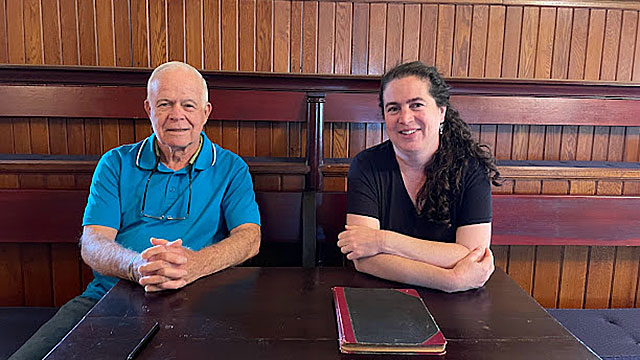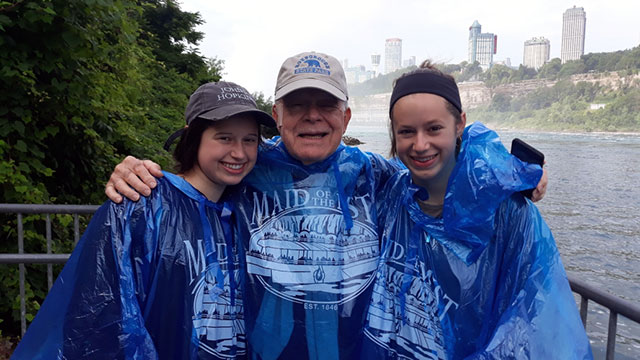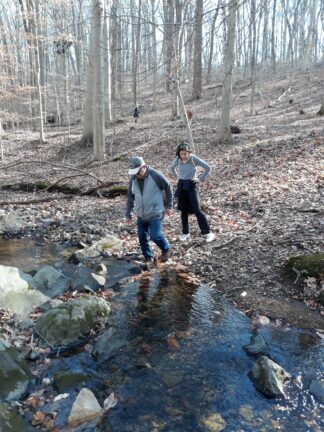
When Kristin Simmons’ youngest daughter was born, her husband Tim was working at Delaware Valley Friends School. As lifelong Catholics, they were feeling disillusioned with church, and decided it was time for a change. Together the family turned to Quakerism, looking for a simpler, connected life to the divine Light. It was both faith and community that drew the couple to Old Haverford Monthly Meeting seventeen years ago. When Kristin was young, her mother worked as a librarian at a Quaker school for 20+ years and committed time focusing on social justice issues and sharing key insights among various faith groups. Kristin’s father, George Salloom, and his wife remained practicing Catholics until about seven years ago when George became a member of the Quaker community.
The father and daughter duo, George and Kristin, now serve as co-clerks at Old Haverford Meeting. They both hold master’s degrees in social work; George graduated from Howard University while Kristin graduated from University of Pennsylvania. Kristin also currently serves as PYM’s Youth Engagement Coordinator on the Program and Religious Life team. Their stories of how they became Quakers and co-clerks of Old Haverford Monthly Meeting are heartwarming and engaging.
Q: Is there something in Quakerism that appealed to you compared to any past faith you may have practiced?
George was exploring his own personal spiritual experiences by reading and meditation and finding it healthy to explore new ways of thinking about life and the afterlife. George shared what he was exploring with his daughter Kristin who ultimately influenced his decision to become a Quaker. Although he had attended a seminary for three years, he often felt overwhelmed by the dogmatic traditions of the Catholic faith and was actively seeking to focus more on his own personal spiritual experiences. At first, George didn’t feel immediately connected but Kristin helped him navigate his introduction to Quakerism.
Kristin also introduced George to the spiritual writings of Father Richard Rohr, a well-known contemporary spiritual writer and founder of the Center for Action and Contemplation. George enjoys reading Rohr’s daily meditations which he finds inspirational. He also liked the analogy Rohr used of a tricycle (big wheel) to describe our spiritual journeys where the front large wheel represents our personal experiences while the two smaller wheels represent tradition and sacred writings. For George, his Catholic faith leaned too heavily on tradition and was not balanced with personal experience and the exploration of sacred writings, both ancient and contemporary. Once George realized Quakerism provided a more balanced approach to his spiritual journey, he started attending meeting where he felt accepted and welcomed.
Q: How do you feel your faith contributes to your happiness? Does it make you more patient, kind, loving, and welcoming?
George’s spiritual journey has helped him develop a sense of gratitude for his volunteering experience working as a bereavement support group facilitator for over 30 years. The bereaved have helped him to understand the deep sense of loss others experience when a loved one dies and how this experience may lead to a deeper spiritual meaning in their lives.
Kristin’s faith has led her to be more centered and aware of Quaker values. She was drawn to the quietness, introspection, and relationships that connected her with the community.
Q: You’re co-clerks, what is it like working together?
Kristin and George serve as co-clerks of Old Haverford Meeting. George noted he has been more observant about how the meeting handles business and how members react to one another. The importance of deep listening and not reacting too quickly is key for him. As a retiree, who spends time volunteering, George sees the value of sharing the clerk’s tasks with Kristin who works full time.
Kristin and George rotate every other month clerking meeting for business as they continue in the three-year cycle of being clerks.

Q: What family values do you both bring to your respective roles as co-clerks?
George and his wife have nine grandchildren including Kristin’s two daughters. Kristin noted “Grandpa’s” openness with her daughters in discussing dying and death, sexuality, and social justice issues helps the family to connect inter-generationally. Kristin and George often gather to share family meals, events and holidays. George shared that his involvement with Kristin and their meeting has enhanced their communication and relationship. Through discussing cultural and spiritual issues, they’ve learned how to better understand others’ discernment.
Q: How do you think Quaker education and witnessing their parents’ roles and commitment to Quaker faith may have influenced your children’s life and/or professional decisions?
Kristin’s children were baptized Catholic at birth but have grown up in Old Haverford Meeting. Their experience growing up in the Quaker faith has allowed them to have an intergenerational perspective while also feeling they have a voice. Adults in the meeting have served as role models, shown values, and listened to their voices. Both feel confident in who they are and chat easily with adults. The meeting even hosted a graduation ceremony where all could celebrate her daughter’s milestone accomplishment. It’s been apparent that they feel a sense of home and have been influenced in their world view through civic engagement, social injustice and finding God everywhere. These experiences were only further enhanced when George joined the meeting. Their family are now a part of a larger faith-based and discerning community.
Q: As a child of an aging parent, what are some of the life lessons you are learning at this point in your relationship with your parents?
Kristin is thankful that her parents are healthy and active, especially having experienced the loss of her in-laws 20 years ago. Nowadays, George enjoys hiking with her family. With both parents retired, they spend their time volunteering.
The knowledge shared by George on dying and death has prompted Kristin’s mother to share songs for her granddaughter to sing at her memorial after her death. The family does not consider these morbid acts but rather cherish the sharing of these moments that help to build a life of awareness for the family.
George expressed gratitude for good health and well-being. In his professional life as a health care advocate, he has observed families with aging members who require long-term care and how adult children respond. It is his hope that he and his wife can stay at home as long as possible and if they need more care, their children will be supportive.

Q: What has made you the happiest in your professional work? What is an example of the most fulfilling work you’ve done in your life?
As noted, George’s professional work was primarily in health care. Now, in addition to his bereavement work he also visits hospice patients in their homes or in health care facilities. He has observed that one of the most common fears the dying have is the fear of being forgotten. These interactions encourage him to remember his own ancestors by name and to be purposeful in making connections in his lifetime.
In the Haverford Quarter, George is involved with the newly formed Caregivers Support Group. Those attending come together to share their experiences and to gain support. Recognizing it’s difficult for caregivers to attend meetings, the program is hybrid with both Zoom and in-person availability. Sheila Sorkin, PYM Aging Support Coordinator, is delighted to be invited to participate in the upcoming August 16th meeting at 7 p.m. where she will discuss the aging support services offered by PYM.
Over the years Kristin has had a variety of work experiences in the fields of education, social work, and youth/young adult programming. Looking back, she realizes that all her roles have prioritized building relationships and fostering a sense of belonging. This focus on inclusion and community is very important to Kristin, as a social worker and as someone who works with youth and young adults.
Kristin and George want others to know that while they take their co-clerking responsibilities seriously, there is always time for fun and laughter.
This article was prepared by Sheila Sorkin, PYM Aging Support Coordinator in collaboration with Tiffanie McKinnon, Senior Content Manager and member of the PYM Communications team to provide support, resources and engage the aging community of the Philadelphia Yearly Meeting as part of the “To Brighten Your Day” series.